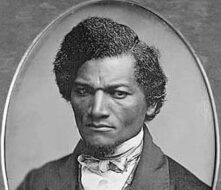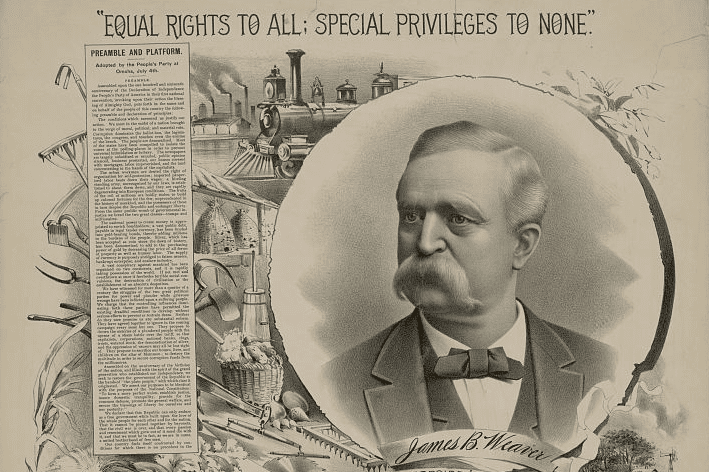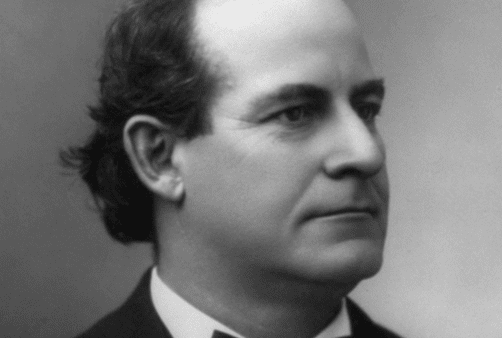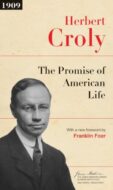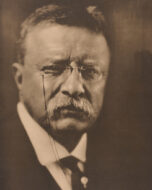
No related resources
Introduction
Woodrow Wilson delivered the following speech several times, perhaps most famously as a commencement address at the University of Tennessee on June 17, 1890. The address was first published as an essay in an edited volume many years after Wilson’s death. Wilson here examined what he took to be the qualities necessary for political leadership in a popular government, focusing above all on the statesman’s ability to lead and shape public opinion through appropriate political rhetoric. A true leader of men, Wilson argued, must interpret the public mind—often understanding public opinion better than the people themselves—and be able to lead the people toward right opinions about the progressive ends and means of government. Wilson had pointed to this idea in his earlier essay, “The Study of Administration”, and would later connect some of these ideas specifically to the American presidency in his 1908 book Constitutional Government in the United States. There, Wilson identified the president as a powerful vehicle for opinion leadership and progressive reform
Source: Woodrow Wilson, “Leaders of Men,” in Leaders of Men, ed. T. H. Vail Motter (Princeton: Princeton University Press, 1952), 19–46, available online at the Hathi Trust Digital Library: https://babel.hathitrust.org/cgi/pt?id=uc1.c080970683&view=1up&seq=1.
. . . That the leader of men must have such sympathetic and penetrative insight as shall enable him to discern quite unerringly the motives which move other men in the mass is of course self-evident; but the insight which he must have is not the Shakespearian insight. It need not pierce the particular secrets of individual men: it need only know what it is that lies waiting to be stirred in the minds and purposes of groups and masses of men. Besides, it is not a sympathy that serves, but a sympathy whose power is to command, to command by knowing its instrument. . . .
The competent leader of men cares little for the interior niceties of other people’s characters: he cares much—everything—for the external uses to which they may be put. His will seeks the lines of least resistance; but the whole question with him is a question of the application of force. There are men to be moved: how shall he move them? He supplies the power; others supply only the materials upon which that power operates. The power will fail if it be misapplied; it will be misapplied if it be not suitable both in kind and method to the nature of the materials upon which it is spent; but that nature is, after all, only its means. It is the power which dictates, dominates: the materials yield. Men are as clay in the hands of the consummate leader.
It often happens that the leader displays a sagacity and an insight in the handling of men in the mass which quite baffle the wits of the shrewdest analyst of individual character. Men in the mass differ from men as individuals. A man who knows, and keenly knows, every man in town may yet fail to understand a mob or a mass meeting of his fellow townsmen. Just as the whole tone and method suitable for a public speech are foreign to the tone and method proper in individual, face-to-face dealings with separate men, so is the art of leading different from the art of writing novels.
Some of the gifts and qualities which most commend the literary man to success would inevitably doom the would-be leader to failure. One could wish for no better proof and example of this than is furnished by the career of that most notable of great Irishmen, Edmund Burke.[1] Everyone knows that Burke’s life was spent in Parliament, and everyone knows that the eloquence he poured forth there is as deathless as our literature; and yet everyone is left to wonder in presence of the indubitable fact that he was of so little consequence in the actual direction of affairs. How noble a figure in the history of English politics: how large a man; how commanding a mind; and yet how ineffectual in the work of bringing men to turn their faces as he would have them, toward the high purposes he had ever in view! We hear with astonishment that after the delivery of that consummate speech on the Nabob of Arcot’s debts, which everybody has read, Pitt and Grenville easily agree that they need not trouble themselves to make any reply.[2] His speech on conciliation with America is not only wise beyond precedent in the annals of debate, but marches also with a force of phrase which, it would seem, must have been irresistible; and yet we know that it emptied the House of all audience![3] . . .
. . . [Burke’s] power was literary, not forensic; he was no leader of men. He was an organizer of thought, but not of party victories. “Burke is a wise man,” said Fox, “but he is wise too soon.”[4] He was wise also too much. He went on from the wisdom of today to the wisdom of tomorrow, to the wisdom which is for all time. It was impossible he should be followed so far. Men want the wisdom which they are expected to apply to be obvious, and to be conveniently limited in amount. They want a thoroughly trustworthy article, with very simple adjustments and manifest present uses. Elaborate it, increase the expenditure of thought necessary to obtain it, and they will decline to listen to any propositions concerning it. You must keep it in stock for the use of the next generation.
Men are not led by being told what they do not know. Persuasion is a force, but not information; and persuasion is accomplished by creeping into the confidence of those you would lead. Their confidence is not gained by preaching new thoughts to them. It is gained by qualities which they can recognize at first sight by arguments which they can assimilate at once: by the things which find easy and intermediate entrance into their minds, and which are easily transmitted to the palms of their hands or to the ends of their walking-sticks in the shape of applause. Burke’s thoughts penetrate the mind and possess the heart of the quiet student. His style of saying things fills the attention as if it were finest music. But his are not thoughts to be shouted over; his is not a style to ravish the ear of the voter at the hustings. If you would be a leader of men, you must lead your own generation, not the next. Your playing must be good now, while the play is on the boards and the audience in the seats: it will not get you the repute of a great actor to have excellencies discovered in you afterward. Burke’s genius, besides, made conservative men uneasy. How could a man be safe who had so many ideas? . . .
. . . Cobden was doubtless right when he said that “the only way in which the soul of a great nation can be stirred, is by appealing to its sympathies with a true principle in its unalloyed simplicity,” and that it was “necessary for the concentration of a people’s mind that an individual should become the incarnation of a principle”; but the emphasis should be laid on the “unalloyed simplicity” of the principle.[5] It will not do to incarnate too many ideas at a time if you are to be universally understood and numerously followed.
Cobden himself is an excellent case in point. Embodying a true principle of unhampered commerce in its “unalloyed simplicity,” he became a power in England second to none. Never did England so steadily yield to argument, so steadily thaw under persuasion, as while Cobden occupied the platform. Cobden was singularly equipped for leadership—especially for leadership of this practical, business-like kind. He had in him nothing of the literary mind, which conceives images and is dominated by associations: he conceived only facts, and was dominated by programs of reform. . . .
Mark the simplicity and directness of the arguments and ideas of such men. The motives which they urge are elemental; the morality which they seek to enforce is large and obvious; the policy they emphasize purged of all subtlety. They give you the fine gold of truth in the nugget, not cunningly beaten into elaborate shapes and chased with intricate patterns. “If oratory were a business and not an art,” says Mr. Justin McCarthy, “then it might be contended reasonably enough that Mr. Cobden was one of the greatest orators England has ever known. Nothing could exceed the persuasiveness of his style. His manner was simple, sweet, and earnest. It persuaded by convincing. It was transparently sincere.”[6] In a word, its simplicity and clearness gave it entrance into the minds of his auditors, its sincerity into their hearts. . . .
Style has of course a great deal to do with such effects in popular oratory. Armies have not won battles by sword-fencing, but by the fierce cut of the sabre, the direct volley of musketry, the straightforward argument of artillery, the impetuous dash of cavalry. And it is in the same way that oratorical battles are won: not by the nice refinements of statement, the deft sword-play of dialectic fence, but by the straight and speedy thrusts of speech sent through and through the gross and obvious frame of a subject. It must be clear and always clear what the sentences would be about. They must be advanced with the firm tread of disciplined march. Their meaning must ring clear and loud.
There is also much in physical gifts, as everybody knows. The popular leader should be satisfying to the eye and to the ear: broad, sturdy, clear-eyed, musically voiced, like John Bright; built with the stature and mien of a Norse god, like Webster; towering, imperious, persuading by voice and carriage, like Clay; or vast, rugged, fulminating, like Daniel O’Connell, fit for a Celtic Olympus.[7] . . .
The whole question of leadership receives sharp practical test in a popular legislative assembly. The revolutions which have changed the whole principle and method of government within the last hundred years have created a new kind of leadership in legislation: a leadership which is not yet, perhaps, fully understood. It used to be thought that legislation was an affair proper to be conducted only by the few who were instructed, for the benefit of the many who were uninstructed: that statesmanship was a function of origination for which only trained and instructed men were fit. Those who actually conducted legislation and undertook affairs were rather whimsically chosen by Fortune to illustrate this theory, but such was the ruling thought in politics. The Sovereignty of the People, however, that great modern dogma of politics, has erected a different conception—or, if so be that, in the slowness of our thought, we adhere to the old conception, has at least created a very different practice. When we are angry with public men nowadays we charge them with subserving instead of forming and directing public opinion. It is to be suspected that when we make such charges we are suffering our standards of judgment to lag behind our politics. When an Englishman declares that Mr. Gladstone is truckling to public opinion in his Irish policy, he surely cannot expect us to despise Mr. Gladstone on that account, even if the declaration be true, inasmuch as it is now quite indisputably the last part of the nineteenth century, and the nineteenth is a century, we know, which has established the principle that public opinion must be truckled to (if you will use a disagreeable word) in the conduct of government. A man, surely, would not fish for votes (if that be what Mr. Gladstone is doing) among the minority—particularly if he be in his eightieth year and in need of getting the votes at once if he is to get them at all.[8] He must believe, at any rate, that he is throwing his bait among the majority. And it is a dignified proposition with us—is [it] not?—that as is the majority, so ought the government to be.
Pray do not misunderstand me. I am not radical. I would not for the world be instrumental in discrediting the ancient and honorable pastime of abusing demagogues. Demagogues were quite evidently, it seems to me, meant for abuse, if we are to argue by exclusion: for assuredly they were never known to serve any other useful purpose. I will follow the hounds any day in pursuit of one of the wily, doubling rascals, however rough the country to be ridden over. . . .
. . . Society is not a crowd, but an organism; and, like every organism, it must grow as a whole or else be deformed. The world is agreed, too, that it is an organism also in this, that it will die unless it be vital in every part. That is the only line of reasoning by which we can really establish the majority in legitimate authority. This organic whole, Society, is made up, obviously, for the most part, of the majority. It grows by the development of its aptitudes and desires, and under their guidance. The evolution of its institutions must take place by slow modification and nice all-round adjustment. And all this is but a careful and abstract way of saying that no reform may succeed for which the major thought of the nation is not prepared: that the instructed few may not be safe leaders except in so far as they have communicated their instruction to the many—except in so far as they have transmuted their thought into a common, a popular thought.
Let us fairly distinguish, therefore, the peculiar and delicate duties of the popular leader from the not very peculiar or delicate misdemeanors of the demagogue. Leadership, for the statesman, is interpretation. He must read the common thought: he must test and calculate very circumspectly the preparation of the nation for the next move in the progress of politics. If he fairly hit the popular thought, when we have missed it, are we to say that he is a demagogue? The nice point is to distinguish the firm and progressive popular thought from the momentary and whimsical popular mood, the transitory or mistaken popular passion. But it is fatally easy to blame or misunderstand the statesman. Our temperament is one of logic, let us say. We hold that one and one make two and we see no salvation for the people except they receive the truth. The statesman is of another opinion. One and one doubtless make two, he is ready to admit, but the people think that one and one make more than two and until they see otherwise we shall have to legislate on that supposition. . . . This is not to talk nonsense. The Roman augurs very soon discovered that sacred fowls drank water and pecked grain with no sage intent of prophecy, but from motives quite mundane and simple.[9] But it would have been a revolution to say so in the face of a people who believed otherwise, and executive policy had to proceed on the theory of a divine method of fowl appetite and digestion. . . .
In no case may we safely hurry the organism away from its habit: for it is held together by that habit, and by it is enabled to perform its functions completely. The constituent habit of a people inheres in its thought, and to that thought legislation—even the legislation that advances and modifies habit—must keep very near. The ear of the leader must ring with the voices of the people. He cannot be of the school of the prophets; he must be of the number of those who studiously serve the slow-paced daily demand.
In what, then, does political leadership consist? It is leadership in conduct, and leadership in conduct must discern and strengthen the tendencies that make for development. The legislative leader must perceive the direction of the nation’s permanent forces, and must feel the speed of their operation. There is initiative here, but not novelty. There are old thoughts, but a progressive application of them. . . .
. . . In the words of the master, Burke, “to follow, not to force, the public inclination—to give a direction, a form, a technical dress, and a specific sanction, to the general sense of the community, is the true end of legislation.”[10] That general sense of the community may wait to be aroused, and the statesman must arouse it; may be inchoate and vague, and the statesman must formulate and make it explicit. But he cannot and he should not do more. The forces of the public thought may be blind: he must lend them sight; they may blunder: he must set them right. He can do something, indeed, to create such forces of opinion; but it is a creation of forms, not of substance, and without such forces at his back he can do nothing effective.
This function of interpretation, this careful exclusion of individual origination it is that makes it difficult for the impatient original mind to distinguish the popular statesman from the demagogue. The demagogue sees and seeks self-interest in an acquiescent reading of that part of the public thought upon which he depends for votes; the statesman, also reading the common inclination, also, when he reads aright, obtains the votes that keep him in power. But if you will justly observe the two, you will find the one trimming to the inclinations of the moment, the other obedient only to the permanent purposes of the public mind. The one adjusts his sails to the breeze of the day; the other makes his plans to ripen with the slow progress of the years. While the one solicitously watches the capricious changes of the weather, the other diligently sows the grains in their seasons. The one ministers to himself, the other to the race. . . .
- 1. Edmund Burke (1729–1797) was an Irish English statesman and political thinker. A Whig and member of the House of Commons, Burke is remembered not only for his political writings, but also for his brilliant oratory.
- 2. See Burke’s speech on the Nabob of Arcot’s debts (February 28, 1785), in which he criticized the abuses of the British East India Company. Allied with the company, the Nabob of Arcot ruled the Carnatic area of south India. William Pitt the Younger (1759–1806) and William Wyndham Grenville (1759–1834) were influential Tory members of Parliament. Pitt was prime minister at the time of Burke’s speech. Among other things, Pitt’s 1784 India Act established a board of control, representing the British government, to oversee the actions and revenues of the East India Company. Through a restructuring of governing authority, the act helped to centralize British rule in India.
- 3. See Burke’s speech on conciliation with America (March 22, 1775), in which he criticized the British government’s policies in America and urged peace and reconciliation with the colonies.
- 4. Charles James Fox (1749–1806) was a Whig member of Parliament and political rival of William Pitt the Younger. Fox supported the events of the French Revolution in 1789 and would have a falling out with his onetime mentor, Burke, who emphatically opposed the Revolution.
- 5. English manufacturer, politician, and free-trade advocate Richard Cobden (1804–1865). The passage here is taken from Cobden’s letter to Sir Robert Peel (June 23, 1846).
- 6. Historian, politician, and Irish nationalist Justin McCarthy (1830–1912). The passage here is taken from McCarthy’s 1880 two-volume study, A History of Our Own Times: From the Ascension of Queen Victoria to the General Election of 1880.
- 7. British statesman John Bright (1811–1889); American statesmen Daniel Webster (1782–1852) and Henry Clay (1777–1852); Irish statesman Daniel O’Connell (1775–1847).
- 8. Prime Minister William Ewert Gladstone (1809–1898) advocated Irish self-rule in the United Kingdom.
- 9. Roman augurs were priests tasked with interpreting natural signs or omens, such as the behavior of birds, to determine divine will and guide political or military action.
- 10. See Burke's Letter to Sheriffs in Bristol (April 3, 1777).
Annual Message to Congress (1890)
December 01, 1890
Conversation-based seminars for collegial PD, one-day and multi-day seminars, graduate credit seminars (MA degree), online and in-person.


















